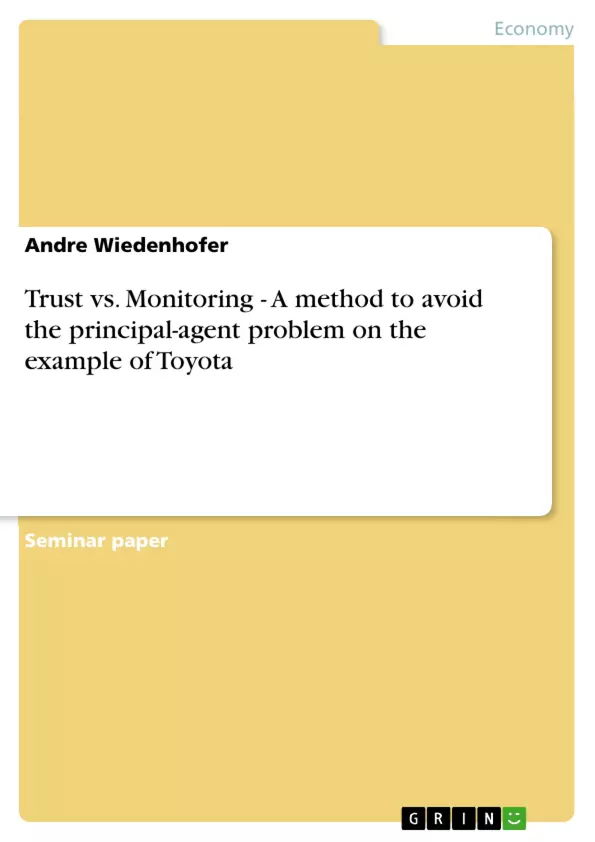The relationship between employer and employee or in general principal and agent is one of the important key determinants that lead to economic success within a firm.
In this paper the relationship between principals and agents regarding an efficient performance of monitoring or trust instruments will be discussed. Having set the basic framework, the instruments to increase trust within the firm will be shown on the example of Toyota. In particular, it will be shown that these instruments increases overall economic success and have highly impact on the relationship of principal and agent.
Table of Contents
- EXECUTIVE SUMMARY
- TABLE OF CONTENTS
- 1 INTRODUCTION
- 2 SCOPE OF WORK
- 3 TRUST AND MONITORING
- 3.1 Theoretical Framework
- 3.2 Definitions
- 3.3 Characteristics of trustful relationships
- 4 TRUST IN PRINCIPAL-AGENT-RELATIONSHIPS
- 5 THE ROLE OF MONITORING
- 6 MAPPING TO TOYOTA'S SITUATION AND ENVIRONMENT
- 6.1 The firm
- 6.2 Instruments to reduce agency costs
- 6.2.1 Superior information
- 6.2.2 Self-managing teams
- 6.2.3 Intrinsic Motivation
- 6.3 Balancing the instruments
- 7 CONCLUSION
Objectives and Key Themes
This assignment aims to analyze the impact of trust and monitoring within the automobile industry, specifically within Toyota, to determine their effectiveness in optimizing leadership and achieving desired results. The paper delves into the theoretical framework of both trust and monitoring, exploring their definitions and the role of trust in principal-agent relationships. It examines the negative consequences of distrust and monitoring on agency costs. The study then applies these theoretical concepts to the real-world case of Toyota, highlighting its specific trust-building instruments and assessing whether neglecting monitoring activities delivers added value.
- Trust and Monitoring in Organizational Structures
- Principal-Agent Theory and its Application to Business Relationships
- Agency Costs and the Role of Trust in Mitigating Them
- Toyota's Approach to Trust and its Impact on Leadership and Performance
- The Balance Between Trust and Monitoring in Achieving Organizational Goals
Chapter Summaries
- Introduction: This chapter sets the context by highlighting the current economic landscape characterized by shorter product lifecycles, intense competition, and a globalized workforce. It emphasizes the need for efficient internal processes to achieve high productivity and meet organizational objectives. The chapter also introduces the central theme of the paper: the interplay of trust and monitoring in organizational structures, particularly in light of the increased latitude of action for both employees and employers.
- Scope of Work: This chapter outlines the specific objectives and methodology of the assignment. It details the approach to defining trust and monitoring, focusing on the framework of the new institutional economy. It also highlights the importance of the principal-agent theory in analyzing the motivations and problems of interacting actors within the organization.
- Trust and Monitoring: This chapter dives into the theoretical framework of trust and monitoring. It provides a concise overview of the neoclassical economy's perspective on coordination, emphasizing the reliance on perfect markets and the assumption of full information. The chapter then introduces the definition of Coase, who describes firms as systems of relationships where resource allocation is dependent on an entrepreneur.
Keywords
The primary keywords and focus topics of this paper are: trust, monitoring, principal-agent theory, agency costs, Toyota, organizational structure, leadership, performance, internal processes, economic environment, globalized workforce, and the new institutional economy.
Frequently Asked Questions
What is the principal-agent problem in business?
The principal-agent problem occurs when the interests of the employer (principal) and the employee (agent) conflict, leading to inefficiencies or agency costs.
How does Toyota use trust to reduce agency costs?
Toyota implements instruments like superior information sharing, self-managing teams, and fostering intrinsic motivation to build a trust-based relationship.
What is the role of monitoring in a company?
Monitoring is used to oversee employee performance, but high levels of monitoring can lead to distrust and increased agency costs.
Can trust replace monitoring entirely?
While Toyota emphasizes trust, the paper discusses the need for a balance between trust and monitoring to achieve organizational goals effectively.
What are "self-managing teams" at Toyota?
These are teams with a high degree of autonomy that manage their own tasks, which increases employee responsibility and reduces the need for external supervision.
- Citar trabajo
- Andre Wiedenhofer (Autor), 2006, Trust vs. Monitoring - A method to avoid the principal-agent problem on the example of Toyota, Múnich, GRIN Verlag, https://www.grin.com/document/76340



